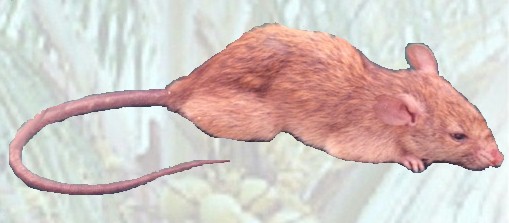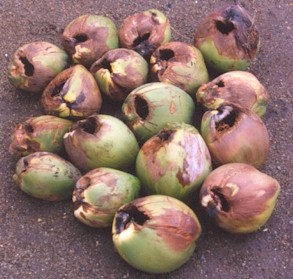Rodents
Among vertebrate pests rodents are the major threat to coconut all over the world. In India 10 species are known to coexist in coconut and its intercrops. The arborial rat, Rattus rattus wroughtoni Hinton causes damage to tender nuts.
The black rat R.r wroughtoni is the predominent pest in coconut based cropping system. It lives in the crowns of the palms by constructing nests made of leaves and twigs. They breed round the year with a peek during summer (Feb-March) and late monsoon (July and August) periods. The ratio of females are higher as compared to males.
Black rats have medium built(100-150 g)with a body length of 13-17 cm. The tail which is devoid of any hair , is much longer than the body.
Indian Gerbil is medium build Rodent 15-18 cm. They have a tuff of hair in tip of tail which is devoid of any hair is much longer than the body.Indian Gerbils are medium sized rodents which has tuff of hair in tip of tail.
Rodent Damage

Rodents damage all stages of palms. Bandicoots and gurbils damage the seedling. Porcupines dabark the stem of young palms. In older plantations, the black rats damage leaf stalks, unopened spathe, female flowers and nuts from button to tender nut stage. Rats and porcupines feed on the mature shed nuts on the palm base.
The burrowing rodents Bandicota bengalensis, B.indica and Gerbil, Tetera indica make extensive burrows in the soil and damage the coconut seedling by eating away the cabbage portion.
Mechanical Control
Banding the coconut trunk with GI sheet 25 - 50 cm wide at a height of 2m above the ground level is effective in controlling the arboreal rats. Once the bands are fixed constant vigil should be maintained to see that no senile frond is hanging parallel to the trunk as they would provide easy access to palm crowns.
Chemical Control
Poisoned Bating
Single dose anticoagulant : Placement of bromodiolone (0.005%) @ 10g on palm crown for every five palms surrounding it should be done at an interval of 12 days is effective in controlling rodents.
Zinc Phosphide baits and prebaits
The bandicoots and gerbils are eefectively controlled by poison bait using zinc phosphide. Poison baits can be prepared by mixing 95 parts of raw rice, three parts of coconut oil and two parts of zinc phosphide. Since zinc phosphide is an acute poison the rodents develop bait shyness towards poison the rodents develop bait shyness towards poison baits. In order to avoid this pre-baitig is reccomended by the placement of plain baits (without poison) in active burrows for 2 - 3 daysbefore placing the poisoned bait.
